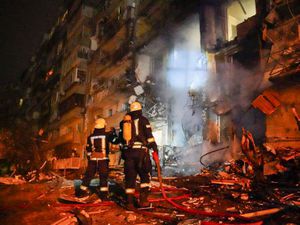Politics: The significance of arms shipments in new European conflict
Hungary 1956. Czechoslovakia 1968. Ukraine 2022. The spirit of Stalin rides again.

Vlad the Invader will care about sanctions as much as Stalin would have.
What Putin and his military commanders might care about, and what a young Russian crewman of an armoured vehicle will have a lot of reason to contemplate, is the shipments of arms made to Ukraine in recent days by America and Britain.
I'm going to take a guess that the sort of weaponry which would be most useful to a nation facing a major armoured invasion would be modern anti-armour weapons, and perhaps some portable anti-aircraft missiles capable of bringing down attack helicopters.
So the questions to ponder are, how many of these have been delivered, do the Ukrainians have the training and capability to use them, and how many of them are resolute and willing to fight for their country?
If you have any doubts about how fearsome and effective such weaponry is, just take the example of Syria, where thanks to American anti-tank weapons supplied by Saudi Arabia (I think) Syrian army tanks were destroyed with enormous accuracy and at great distances.
There is a question mark over whether the effectiveness of such weapons has made armoured vehicles as obsolete as battleships – if the opposition is well-equipped and highly motivated.
By the time you read this tanks may be on the streets of Kiev. That's the very last place you would want to be in a tank if there is continuing resistance.
Years ago I interviewed a local man who had driven a tank during the Second World War during the advance after the Normandy invasion. His name was Mr Green – Richard Green, I think – and he loaned me his memoirs which were called Green Seed Trooper. No book of that name appears on Amazon, so I imagine it was one of those personal accounts mainly written for family and friends.
There are a couple of things I particularly remember. The first is that he and his colleagues were all permanently exhausted and sleep deprived. It's one of those things we overlook about people facing constant danger and fear during the war - that they were very, very tired.
And the second is his story about how they came across an abandoned German tank.
His crew thought they would experiment to see how close they would need to get in their Sherman tank to be reasonably sure of destroying the notoriously well-armoured German tank. They decided to fire at it from point blank range, then move back a couple of hundred yards and fire again, and so on, until they reached a point where their shell failed to penetrate the armour.
They started the experiment by firing at point blank range. Their shell bounced off. "This did nothing for our already knee-high morale," he wrote.
In contrast German anti-tank guns could destroy Allied tanks at long range and the Sherman had a particular reputation for immediately catching fire and incinerating its crews.
Going into battle in a tank with the knowledge that horrible death could strike at any time needed a particular kind of courage.
If the Ukrainians put up any sort of resistance, today it is the Russian tank crews who face that fear.
Russia is saying the opposition is crumbling and melting away and the Ukraine forces are laying down their arms.
Well, they would say that, wouldn't they. It's straight out of the CIA psych-ops playbook, pour discourager les autres. Even if it is true, those American weapons, if skilfully deployed by just a handful of determined operators, could cause grievous, or even catastrophic losses.
We have too to look to the longer term, with a potential insurgency using smuggled-in Western weapons. That would be a nightmare for Putin, and ratchet up West-Russia tensions to a yet more dangerous level.
As for our politicians, for weeks they have chosen to talk about Downing Street parties obsessively while a war was brewing in Europe in the greatest European crisis in a generation. That's the collective calibre of the current crop – so many politicians in Parliament, and such a dearth of statesmen and stateswomen.
Meanwhile it might be an idea to back up your data. Cyberspace may well be a key theatre of war in the new Cold War.





